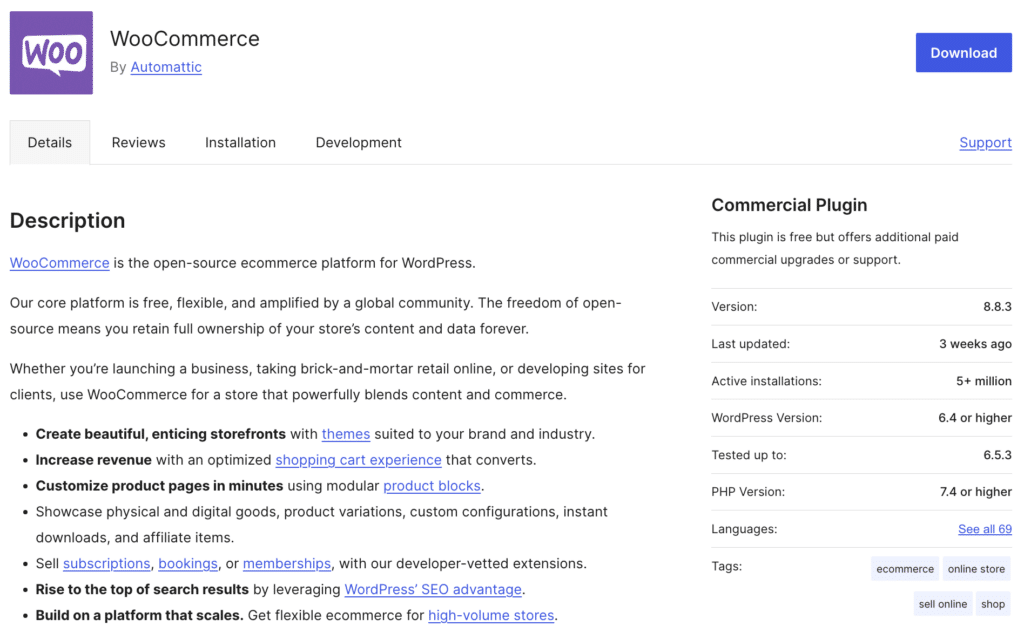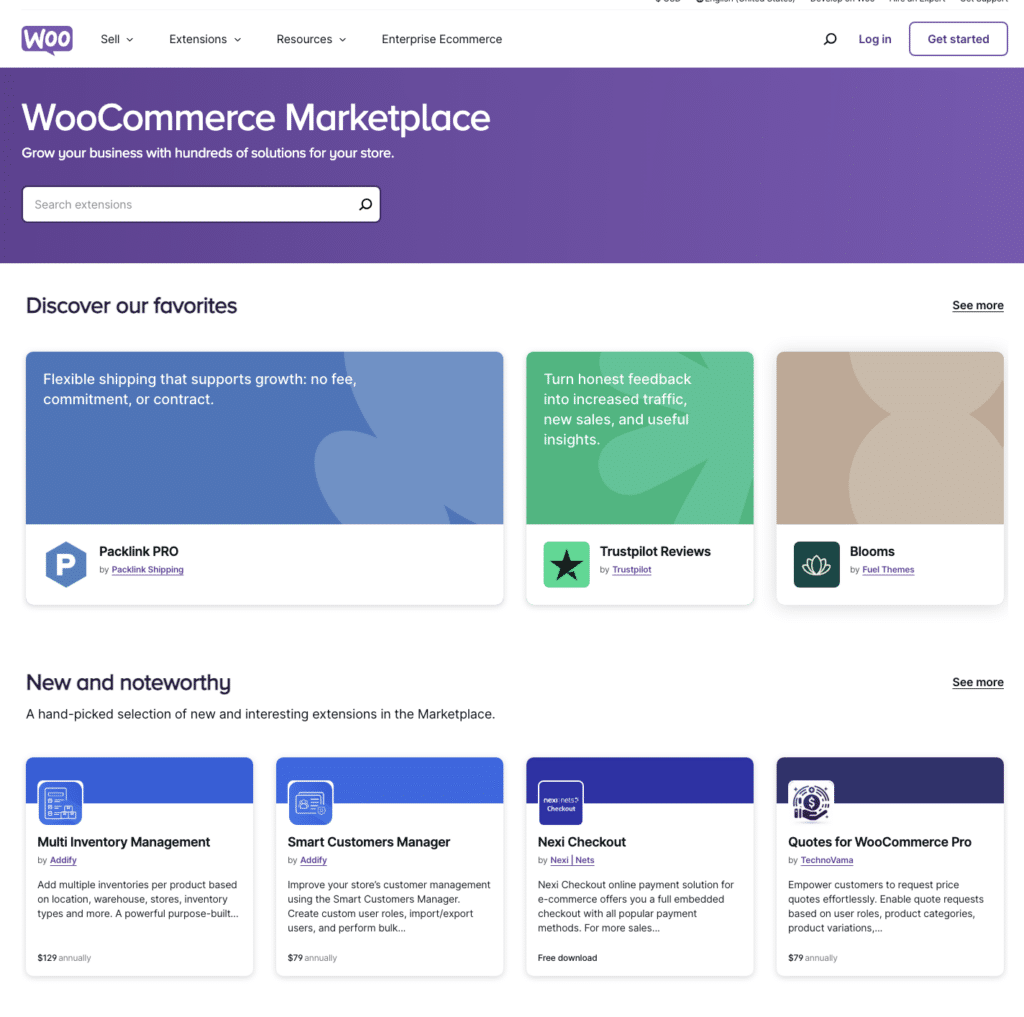When it comes to setting up an online store, WooCommerce is often the go-to choice for many entrepreneurs and small business owners. One of the most attractive features of WooCommerce is its cost—or lack thereof. WooCommerce is a free plugin available on WordPress, making it an accessible option for anyone looking to enter the world of e-commerce. In this article, we’ll explore the basic costs associated with WooCommerce and highlight additional expenses you might encounter while building your online store.
What is WordPress?
WordPress is an open-source content management system (CMS) that has become a dominant force in the digital world, powering over 40% of all websites on the internet. Originally created as a platform for bloggers, WordPress has significantly expanded its capabilities over the years. Today, it is a highly versatile and customizable tool that can be used to build a wide variety of websites – from personal blogs and portfolios to sophisticated e-commerce stores and comprehensive corporate websites. WordPress offers the flexibility to meet the needs of virtually any online project.
WooCommerce: A Free Plugin on WordPress
WooCommerce is a powerful and versatile e-commerce platform that integrates seamlessly with WordPress, the world’s most popular content management system. This plugin was made by Automattic. The core WooCommerce plugin itself is entirely free, meaning you can download, install, and start setting up your online store without spending a dime. This zero-cost entry point is particularly beneficial for startups and small businesses operating on tight budgets.

Paid WooCommerce marketplace
While WooCommerce is a free plugin that provides essential tools to set up an online store, its real power and flexibility come from the vast array of extensions and themes available in the WooCommerce marketplace. This marketplace offers both free and paid options, allowing store owners to enhance their e-commerce websites with advanced features and functionalities. These add-ons are developed by both WooCommerce and third-party developers, ensuring a diverse selection of tools to meet various business needs. The marketplace is located on the URL address Woocommerce.com/products/.

Key Features of WooCommerce:
- Unlimited Products: Add as many products as you like without any restrictions.
- Flexible Payment Options: Accept payments via various methods, including credit cards, PayPal, and more.
- Inventory Management: Keep track of stock levels, manage orders, and handle shipping with ease.
- Customizable Design: Choose from a wide range of themes and extensions to tailor your store’s appearance and functionality.
WooCommerce: Additional Costs to Consider
While the core WooCommerce plugin is free, there are other costs associated with running a WooCommerce store that you should consider:
Domain Name and Hosting:
- Domain Name: Typically costs around $10-$15 per year.
- Web Hosting: Depending on the provider and plan, hosting can range from $5 to $30 per month for basic shared hosting. For more robust performance, managed WordPress hosting might cost between $20 and $100 per month.
Themes and Design:
- Free Themes: There are many free WooCommerce-compatible themes available.
- Premium Themes: Premium themes typically cost between $30 and $100, offering enhanced features and customization options.
Plugins and Extensions:
- Free Extensions: WooCommerce offers a variety of free extensions to enhance your store’s functionality.
- Premium Extensions: Depending on your needs, you may want to invest in premium extensions for additional features such as advanced shipping options, payment gateways, and marketing tools. These can range from $30 to several hundred dollars annually.
SSL Certificate:
- To secure your site and protect customer data, an SSL certificate is essential. Some hosting providers include SSL for free, while others may charge between $10 and $100 per year.
Payment Processing Fees:
- Payment gateways like PayPal and Stripe charge transaction fees, typically around 2.9% + $0.30 per transaction. These fees should be factored into your cost considerations.
Development and Maintenance:
- If you need custom development or ongoing maintenance, hiring a developer can cost anywhere from $20 to $150 per hour, depending on the complexity and scope of work.
How many WooCommerce websites are there?
As of recent reports, WooCommerce powers approximately 28% of all online stores, making it one of the most popular e-commerce platforms worldwide. This translates to millions of active installations. Specifically, WooCommerce has over 5 million active installations according to the WordPress plugin repository. The platform’s popularity is driven by its flexibility, extensive customization options, and seamless integration with WordPress, making it a top choice for businesses ranging from small startups to large enterprises looking to establish an online presence.
Woocommerce vs. Shopify
WooCommerce and Shopify are two of the most popular e-commerce platforms, but they cater to different needs and preferences. WooCommerce is a free, open-source plugin for WordPress, providing extensive customization options and flexibility. It is ideal for users who are comfortable with WordPress and want complete control over their website’s design and functionality.
WooCommerce allows for deep customization through a vast array of extensions and themes, making it highly adaptable to various business needs. In contrast, Shopify is a fully hosted, all-in-one e-commerce solution that simplifies the process of setting up and managing an online store. It offers an intuitive interface, reliable hosting, and built-in features, making it an excellent choice for those who prefer a hassle-free, user-friendly experience. While WooCommerce requires more hands-on management and technical know-how, Shopify provides a streamlined, out-of-the-box solution with dedicated customer support, making it easier for beginners to get started.

